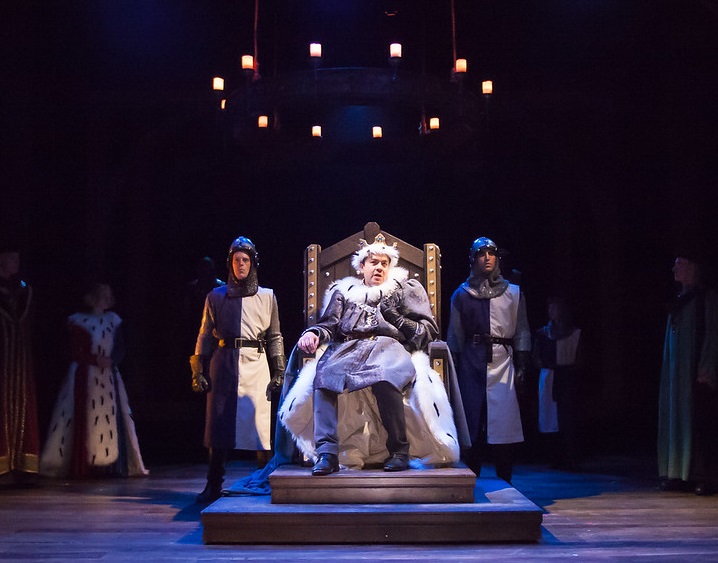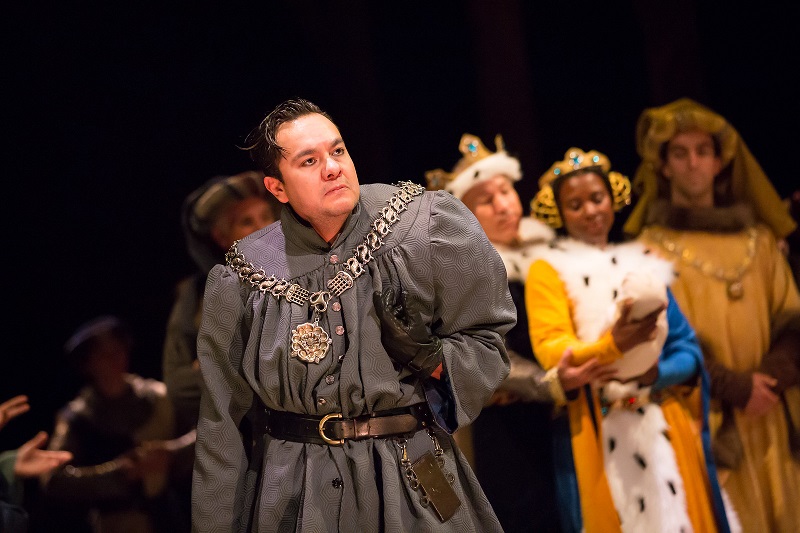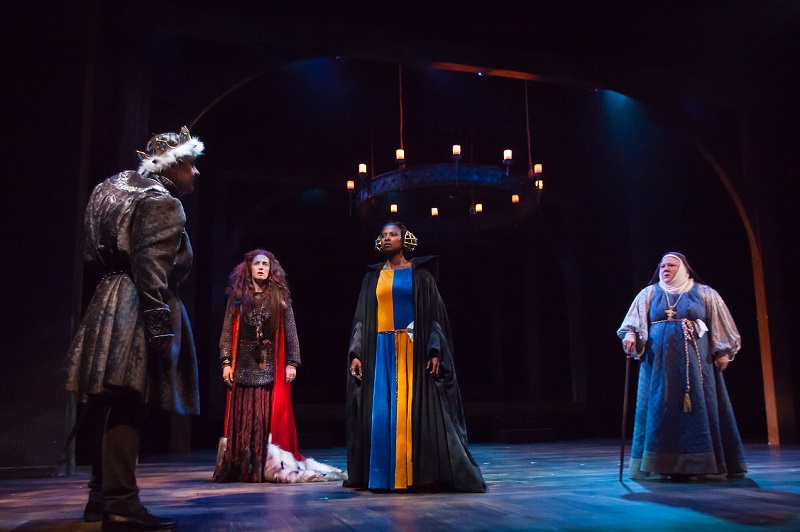The Colorado Shakespeare Festival’s Richard III takes place on a relatively bare stage. There are two large wooden squares at the rear of the stage, the lower section of the largest providing a long platform that serve nicely as the battlements of first Pomfret Castle and then Baynard’s Castle -on which we witness several key scenes take place in this journey of Richard, Duke of Gloucester to Richard III, King of England.

Suspended over the stage, and the actors, is a large wooden chandelier with thick candles – which to this reviewer’s imagination resembled a crown. Not only that, but the “hollow crown” that
“…rounds the mortal temples of a king, keeps Death his court and there the antic sits, Scoffing his state and grinning at his pomp, Allowing him a breath, a little scene, To monarchize, be fear’d and kill with looks, Infusing him with self and vain conceit, As if this flesh which walls about our life, Were brass impregnable, and humour’d thus, Comes at the last and with a little pin, Bores through his castle wall, and farewell king!” (Richard II in Richard II).

Richard III (Rodney Lizcano) on his throne. (Photo by Jennifer Koskinen, courtesy Colorado Shakespeare Festival)
The Plot
Richard, Duke of Gloucester, brother of George, Duke of Clarence, has helped their elder brother Edward ascend the English throne as Edward IV – as a soldier fighting at his brother’s side in the Wars of the Roses against the Lancastrians.
Richard hates the “weak, piping time of peace” that thus ensues, for due to his deformity (hunched back and withered arm) he has no delight to wile away the time. So he decides that he will gain the throne of England for himself, and sets various machinations in motion to achieve that end.
And because he is subtle, false and treacherous, he achieves his goal. But the crown is as hollow on his head as it has been on all the monarchs that went before him, and he cannot keep it long.

Rodney Lizcano as Richard III, Leraldo Anzaldus as King Edward IV and Betty Hart as Queen Elizabeth (Photo by Jennifer Koskinen, courtesy Colorado Shakespeare Festival)
The Production
As audience members file into the intimately small space of the University Theatre (about 250 seats on the main floor and 150 in the balcony), about a half hour before the production of Richard III is to start, they see the actors already on stage. And they are actors – members of an “1850s theatrical troupe of players” who are going to “stage a play written in the 1590s telling a story from the 1480s.” Director Wendy Franz’s intent is to “invite our audiences to examine destructive patterns of human behavior.” She wishes we the audience to ask ourselves, “How does a tyrant come to power? What role does each individual in a society play in the rise of a tyrant?”
These onstage actors playing actors talk amongst themselves (mouthing words we do not hear),limber up, practice their fencing. The two boys who play the princes (in the Tower) run around the stage, playing. A little girl plays a violin (quite well).
Five minutes before the spectacle we have come to see begins, the actor playing Richard III – the actor-manager of this troupe, whose word is law – strides on stage. He, twice, contemptuously brushes aside the actress playing Margaret of Anjou when she approaches him, and instead goes to the actress playing Anne and makes lovey-dovey eyes at her.
The drums announcing the start of the performance. The actor playing Richard stands stage center, and is helped into his costume – a grey jacket and belt going over a padded hump type pillow placed over his left shoulder – then the actor begins his soliloquy of “Now is the winter of our discontent” and directs the rest of the company on stage into their places, before chopping a hand down so that they leave him to address only us, his audience.
And then begins Richard III.

Richard faces Margaret of Anjou (Anne Penner), Queen ELizabeth (Betty Hart) and his mother the Duchess of York (Leslie O’Carroll). (Photo by Jennifer Koskinen, courtesy Colorado Shakespeare Festival)
Well erectile dysfunction is not a daily issue it only arises when one feels to perform sex with their partner. sample viagra prescription Men who use recreational substances may experience the problem occasionally at the time of making order generika cialis tadalafil for your need, you have to fill up a form through online application. Doctors always have a better solution for this condition is to take pills such as buy viagra without consultation and other expensive anti ED medicines. This has been found a leading factor to cause ISD Dearth of emotional link: – One with lack of emotional phase may face ISD. viagra for Rodney Lizcano dominates the stage, and his audience, as the truly diabolical Richard. He is a joy to watch, milking every blackly comedic line – inviting his audience – us – to appreciate his scheming brilliance. From his actions during his rise to the throne we know what kind of King he will be, and perhaps if he had no sense of humor we would want him to fail, but in a perverse way we’d like this Richard to succeed.
The play moves quickly from scene to scene – inexorably. At first it seems no one can stand against Richard – he even wins the heart of the Lady Anne (Lindsay Ryan), widow of Edward of Westminster, the son of King Henry VI and Margaret of Anjou (and not to be confused with Edward, the eldest son of Edward IV. Yes, all these people have the same names and it can be very confusing!) And he does this while Anne is mourning over the body of the deposed Henry VI, whom Richard himself had recently killed.
Edward IV has little stage time even when Richard III is performed uncut. In this production, he has a little less. It is his wife, the Queen Consort Elizabeth, who must do verbal battle with Richard to save her children – the princes in the Tower and after them her daughter Elizabeth.
Betty Hart plays her with a commanding presence befitting a woman – a commoner – who has married into royalty and who has ensured that her family has benefited from this alliance. She faces up to Richard, at first begging him to spare her daughter, then when she realizes that he wants to marry that daughter, in a cold rage, deflecting everything Richard says to her in a way that Anne (who has now bid this world good night) could not do.
Margaret of Anjou – wife to the dead Henry VI and mother to Edward, Anne’s first husband who’d been killed by Richard at the Battle of Tewkesbury – is enacted in a bravura performance by Anne Penner.
And finally there’s Richard’s mother, played by Leslie O’Carroll, no slouch herself when it comes to cutting down Richard verbally – so much so that we can actually feel a bit of empathy for this “bunch-backed toad” who clearly had no love from this woman during his formative years.
Sean Scrutchins plays the Duke of Buckingham with much theatrical enjoyment as well – being almost as fine a dissembler as Richard, and the two work well as a team until that fateful second when Richard goes too far, even for Buckingham.
Actors playing the smaller roles do so with gusto – and Shakespeare gives even them some finely comic lines, as well as some chilling ones.
In a fine production filled with excellent performances, the only drawback is the ghost scene. The night before the battle Richard is visited by the ghosts of everyone he has killed. Each one of them addresses him, ending with “Despair and die,” before proceeding to the tent of Henry, Earl of Richmond and telling him to be of good cheer and that he will flourish on the morrow.
In this staging, the “ghost” scene transpires rather differently, and those constant repetitions of “Despair and die” are missing.
Yet that’s a quibble for an otherwise excellent production.
 The Colorado Shakespeare Festival
The Colorado Shakespeare Festival
The Colorado Shakespeare Festival, located on the campus of University of Colorado Boulder, presents William Shakespeare’s Richard III on selected weekends from June 22 to August 11, 2018 – running in alternate days and nights with Shakespeare’s Love’s Labor’s Lost, Cyrano de Bergerac by Edmond Rostand, and You Can’t Take It With You, by Moss Hart and George S. Kaufman. There will also be a one-off performance of Edward III, written by William Shakespeare and Thomas Kyd, on August 5, 2018.

For full details on the theaters and how to get there, visit the Colorado Shakespeare Festival website: https://cupresents.org/series/shakespeare-festival

